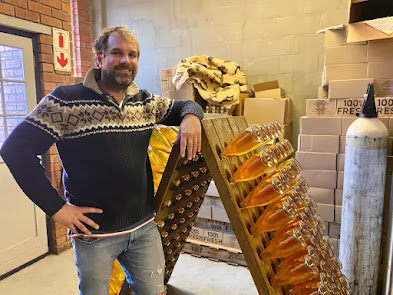This week is a hybrid meeting so that those who wish to can attend and taste various mead products.
He established the Cape Town Meadery in 2018 and I won't preempt his talk.
I was fascinated by this because I had interviewed a Cape Town mead maker last century to whom it was a hobby and I remember tasting a mead that was made like champagne with a secondary fermentation which tasted very like champagne, bone dry but with a completely different nose. Honeyed is the only way to describe it. He was making it for his own wedding which was in a year or so's time so it would be nicely matured.
As you can see from the riddling rack, Ernst also makes a similar sparkling mead so it will be interesting to taste his.
Zen Rankin has offered to provide the food for the evening though she must know how many will be attending asap.
Mário César Martins de Camargo, a member of the Rotary Club of Santo André, São Paulo, Brazil, is the selection of Nominating Committee for President to become Rotary International’s president for 2025-26.
He will officially become the nominee on 15 September if no other candidates challenge him.
De Camargo plans to boost Rotary’s public image by working from the top down.
“Rotary today has strong competition for members and funds,” he says. “We need to rejuvenate the brand, especially in some zones. We should utilize post-pandemic meeting tools … to allow the president to address Rotarians all over the globe. We also need to develop more long-term partnerships with political, community, and business leaders. Let’s emphasize our greatest asset: 1.4 million volunteers.”
He also hopes to improve Rotary’s process for appointments and governance.
“Rotary should adopt a more transparent system to appoint volunteers for positions, with clear criteria and data-based evaluation of results,” he says.
De Camargo was president of Gráfica Bandeirantes and has been a consultant to the print industry in Brazil. He has also served as president and chair of several printing and graphics trade associations, including the Brazilian Association of Graphic Technology and ABIGRAF, the Brazilian Printing Industry Association.
He has served on the board of Casa da Esperança (House of Hope), a hospital sponsored by his Rotary club that serves 150,000 children with disabilities every year.
De Camargo studied in the U.S. and Germany and holds degrees from EAESP-Fundação Getulio Vargas in business administration and Faculdade de Direito de São Bernardo do Campo in law.
A Rotarian since 1980, de Camargo has served Rotary as director, trustee, RI learning facilitator, committee member and chair, and task force member.
De Camargo and his wife, Denise, are Major Donors and Benefactors of The Rotary Foundation.
On 26 January in Odesa, Mykola Stebljanko spent the day under attack. A barrage of missiles killed 11 people and destroyed critical infrastructure around Ukraine, including in the city where Stebljanko lives.
Despite not having working electricity, Stebljanko – who publishes Rotariets, Rotary’s Ukrainian magazine – was determined to report on the situation and Rotary’s response to it. He was able to make a cell phone call to describe an experience he’s had several times during the past year of war.
"Sometimes we have time to go into the shelter, but sometimes there is no time — we're just sitting in our apartment and waiting for the end," he says. "Most of the targets are military or infrastructure objects. Not the buildings for civilians. But sometimes the missiles go to civilian buildings. We just decided, if it will be our building, that will be our destiny."
Even under fire, Stebljanko, a member of the Rotary E-Club of Ukraine, wanted to let members around the world know how important their efforts were. In an interview, he spoke about how members established humanitarian hubs along the Ukrainian border to receive supplies and distribute them throughout the county.
In the city of Kharkiv, he noted, Rotary members who own a shopping center donated space to store supplies.
"They provided a whole underground level for the humanitarian hub," Stebljanko says. "They provide aid each day to thousands of people. In the front line cities, the Rotarians are real heroes. Despite their very complicated life, they try to continue to serve as Rotarians."
Members inside Ukraine have had supplies to distribute partly because of the global network of Rotary members who have used disaster response grants to provide them. They have sent generators, medical supplies, emergency equipment, modular housing, and other provisions, as well as providing support for refugees.
The Rotary Foundation has awarded more than 375 disaster response grants, totaling more than US$17.3 million, to help people affected by the war. More than 280 districts have sponsored grants. That's more than half of all districts.






No comments:
Post a Comment